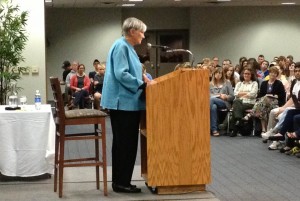“I had trouble in getting to Solla Sollew, where they never have troubles. At least, very few.” Diane Ravitch quoted Dr. Seuss as she opened her lecture on NMU’s campus Thursday, Oct. 10, saying Marquette is as close as she’s seen to a place like “Solla Sollew.”

However, the rest of Michigan and the country is in far worse condition, Ravitch said. Wealth disparity is the highest in history and public education is under severe threat. She introduced her book, “Reign of Error,” which she provided at the event free of charge.
New York Times Bestseller “Reign of Error: The Hoax of the Privatization Movement and the Danger to America’s Public Schools” (2013) was written in response to critics who falsely claimed Ravitch was “long on criticism and short on solutions,” she said.
Associate Dean for Education, Leadership and Public Service Joe Lubig said Ravitch’s speaking fee came back unexpectedly in the form of 800 hardcover books meant for distribution to the audience, school boards, libraries, teachers and legislators.
“It was quite a gift,” Lubig said.
Ravitch, former assistant secretary of education in the senior Bush administration, twice appointed to the national assessment governing board by former President Clinton, author of 11 books and research professor of education at New York University, spoke to a packed audience in the Great Lakes Room of the University Center. The event was sponsored by Platform Personalities and other donors.
Ravitch outlined what she terms as “hoaxes” propagated by the Bush-Obama administrations and the media, which promote an education reform amounting to “budget cuts, firing teachers, closing schools, increased standardized testing and turning schools over to corporations.”
Teacher “deselection” (firing) is a method promoted in corporate reform to improve student test scores, Ravitch said, a policy with no basis in evidence. She described how a recent Houston “teacher of the year” was fired for low student test scores.
“Considerable research shows there is no rhyme or reason for which teachers get fired and which get a bonus,” she said. “The metric for finding ‘bad teachers’ is arbitrary and capricious.”
Standardized testing also defeats the diagnostic purpose of testing, Ravitch said, because students and teachers have no way of reviewing their answers.
“[Standardized] testing is an accurate measure of a student’s income bracket,” she said. “We are the only country in the world to test every student every year.”
Formerly a proponent of standardized testing and reform such as former President Bush’s “No Child Left Behind” act (NCLB), “It was only after I saw the corrosive effects of [NCLB] that I reconsidered my long-held beliefs,” she explains in her book.
“The biggest hoax of our day,” she said, “is that ‘our schools are failing.’” She said test scores and graduation rates are the highest in U.S. history.
Other “hoaxes” include the claim that the “private sector does it better,” and that “technology will save us.” Though there is a great deal of profit associated with privatizing education, neither of these address the real problems, she said, which are poverty and segregation.
School districts increasingly adhere to the private sector’s strategy of “risk management,” or “how to get rid of losers and keep winners,” she said. This policy leaves behind children with disabilities and low test scores, for the sake of higher ratings and avoiding closure.
What corporate reformers don’t seem to understand, Ravitch said, is that, “When a school is closed, it is a dagger in the heart of a community.”
Ravitch offered many solutions for problems facing schools today, acknowledging they are neither easy nor cheap, but said she is optimistic about grass-roots action across the country.
Solutions include prenatal care for poor women, reduced class sizes, full enriched curriculums for all children including physical education and the arts, adequate medical care for all students, strengthening of the teaching profession through higher education standards, “peer assistance and review” evaluations and most importantly, a reduction in poverty and segregation in communities.
Samantha Hawkins, a senior elementary education major in attendance, said hearing Ravitch speak was an exceptional experience, though she was already familiar with many issues as a student and future teacher herself.
“I always wanted to be a teacher,” she said. “I want to encourage students to love learning as much as I do.”
“Teachers need people to say ‘thank you,’” Ravitch said afterward. “Everyone should say ‘thank you’ to their teachers every day.”
Ravitch’s blog can be found at www.dianeravitch.com.
























